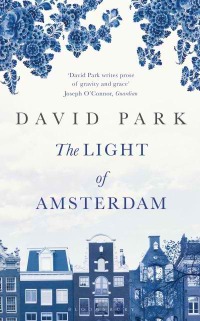The Poets' Wives by David Park
 Friday, May 23, 2014 at 9:33AM
Friday, May 23, 2014 at 9:33AM 
Published by Bloomsbury USA on April 1, 2014
The Poets' Wives examines the lives of three women whose husbands have died. The husbands were poets, two of them real. Had the novel offered more meaningful insight into the literary husbands, or had it revealed something more meaningful about the wives, I would have been more taken with it. If there is an organizing theme here, it is that living with a poet guarantees an oppressive existence.
The first poet is William Blake. His wife is Kate, who begins the novel with a visit from her dead husband. Sometimes a ghost works well as a literary device but here it feels contrived. The visit prompts Kate to recall the events of her life. She spends much of that life resting in bed as she responds to domestic and external disasters with bouts of ill health. After Kate suffers a miscarriage, William takes on a domestic helper of ill-repute named Lizzie who inspires Kate's jealousy. William's poem about the pointless nature of Kate's jealousy does nothing to ward off her despair, but the context that the story provides to Blake's poem is a highlight of the novel; I wish there had been more of that. When William is accused of seditious utterings and placed on trial, Kate goes back to bed. Perhaps William would have been better suited for harlot Lizzie, who shocks Kate by advising her to perform the services depicted in the engravings that William has carefully hidden in his desk. That scene is another of the novel's highlights but it leads only to Kate's declaration that there are "two creatures living inside" her husband's brain, representatives of both heaven and hell. Chatting with his ghost gives her a clue about the direction in which his postmortem travel took him.
Quite suddenly, given the novel's languorous pace, William is old and then a ghost. The novel then moves to 1939 and to the difficult life of the wife of dissident Russian poet Osip Mandelstam, who keeps her imprisoned husband's poems alive in her memory (the best touch in this section of the novel). The story backs up to 1935 as we see Mandelstam and his wife at the end of his exile (before he again offended Stalin), but we learn surprisingly little about Mandelstam's poetry, apart from its anti-Stalinist slant. We then flash to 1947, many years after Mandelstam's death in a prison camp, only to track Nadezhda Mandelstam's memories of Osip's arrest in 1938. The story resumes in 1952 as Nadezhda contemplates "the true nature of love" and recalls (with some resentment) the love poems that Osip wrote to his mistress. Then we're back in 1934, then 1950, then 1939, then 1956. Sometimes the "jump forward, flash back" structure to a novel works well but here I'm not sure what purpose it was meant to serve. This is the lengthiest section of the novel and, I thought, the least interesting.
The final section belongs to Lydia in Belfast, the wife of an imaginary poet named Don who has just died of a heart attack. Lydia has lived a financially insecure life because poetry doesn't sell and Don, while a notable poet, was overshadowed by his betters. Lydia spends the day after his funeral cataloging Don's failings as a husband, father, and poet. Eventually her daughters join her in that task. Don has left behind an unfinished book of poems from which occasional lines are quoted, but not enough for the reader to evaluate Don's style or ability to construct a complete poem. This seems like cheating to me, simply because it is easier to write fragments of poetry than it is to write poetry. Apart from the fact that Lydia stayed with her philandering husband out of respect for his poetry, we learn very little of interest about Lydia.
David Park's prose is lush but it is also dense. Poets express ideas with an economy of language; Park bombards the reader with words, which seems like the wrong way to write about poets. Park writes beautifully crafted sentences but a third of them could have been omitted without harming the novel. All three sections contain lengthy descriptions of brooding that struck me as tedious. Park made me understand the poets' wives, and that's too his credit, but he didn't make me empathize with their self-absorbed frustration.
NOT RECOMMENDED
 TChris |
TChris |  Post a Comment |
Post a Comment |  David Park in
David Park in  General Fiction
General Fiction 